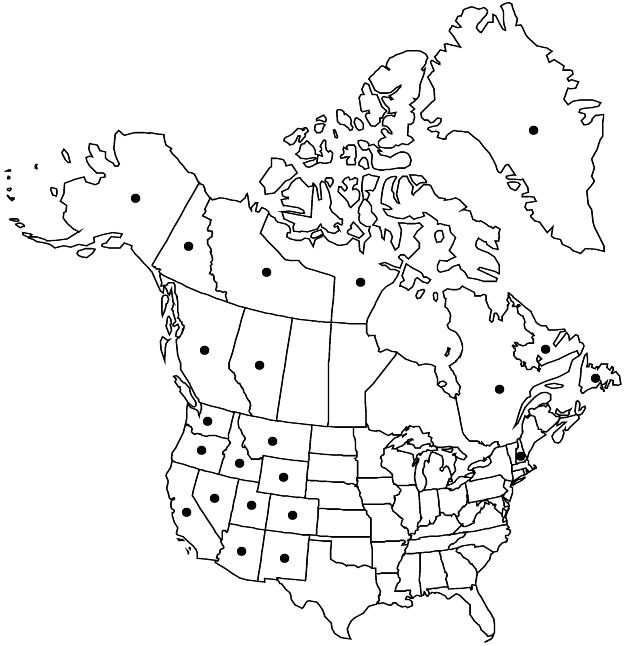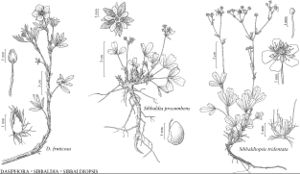Difference between revisions of "Sibbaldia procumbens"
Sp. Pl. 1: 284. 1753.
FNA>Volume Importer |
imported>Volume Importer |
||
| (5 intermediate revisions by 2 users not shown) | |||
| Line 10: | Line 10: | ||
|special_status={{Treatment/ID/Special_status | |special_status={{Treatment/ID/Special_status | ||
|code=F | |code=F | ||
| − | |label= | + | |label=Illustrated |
}} | }} | ||
|basionyms= | |basionyms= | ||
| Line 16: | Line 16: | ||
|name=Potentilla sibbaldii | |name=Potentilla sibbaldii | ||
|authority=Haller f. | |authority=Haller f. | ||
| + | |rank=species | ||
}} | }} | ||
|hierarchy=Rosaceae;Rosaceae subfam. Rosoideae;Rosaceae tribe Potentilleae;Sibbaldia;Sibbaldia procumbens | |hierarchy=Rosaceae;Rosaceae subfam. Rosoideae;Rosaceae tribe Potentilleae;Sibbaldia;Sibbaldia procumbens | ||
| Line 40: | Line 41: | ||
-->{{#Taxon: | -->{{#Taxon: | ||
name=Sibbaldia procumbens | name=Sibbaldia procumbens | ||
| − | |||
|authority=Linnaeus | |authority=Linnaeus | ||
|rank=species | |rank=species | ||
| Line 54: | Line 54: | ||
|publication title=Sp. Pl. | |publication title=Sp. Pl. | ||
|publication year=1753 | |publication year=1753 | ||
| − | |special status= | + | |special status=Illustrated |
| − | |source xml=https:// | + | |source xml=https://bitbucket.org/aafc-mbb/fna-data-curation/src/2e0870ddd59836b60bcf96646a41e87ea5a5943a/coarse_grained_fna_xml/V9/V9_484.xml |
|subfamily=Rosaceae subfam. Rosoideae | |subfamily=Rosaceae subfam. Rosoideae | ||
|tribe=Rosaceae tribe Potentilleae | |tribe=Rosaceae tribe Potentilleae | ||
Latest revision as of 22:57, 5 November 2020
Leaves: stipules 3–6 mm, membranous; petiole (0.5–)1–9(–12) cm; leaflets dark green abaxially, light green adaxially, sessile or petiolulate, 0.5–2.5(–3) × 0.2–1.5(–2) cm, teeth roundish, mucronate, surfaces sparsely appressed-pilose. Pedicels 1–3(–5) mm, usually minutely stipitate-glandular. Flowers: epicalyx bractlets often becoming reddish with age, linear to narrowly lanceolate, 1–3.5 mm, shorter than sepals, sparsely hirsute or strigose; sepals often becoming reddish with age, 2.5–5 mm, strigose to sparsely pilose; anthers 0.3–0.5 mm; styles 0.4–0.7 mm. Achenes greenish brown to dark brown. 2n = 14.
Phenology: Flowering summer.
Habitat: Dry rocky to gravelly flats and slopes, often in tundra near ocean in the north to subalpine and alpine settings above timberline in the south, snow beds, damp, south-facing herb banks
Elevation: 0–3800[–4200] m
Distribution

Greenland, Alta., B.C., Nfld. and Labr., N.W.T., Nunavut, Que., Yukon, Alaska, Ariz., Calif., Colo., Idaho, Mont., Nev., N.H., N.Mex., Oreg., Utah, Wash., Wyo., Mexico, Eurasia.
Discussion
Sibbaldia procumbens is circumpolar and is common from southern Greenland (to near 72° N) to the Aleutian Islands (to 166° W) of westernmost Alaska. It ranges southward in the Coast Ranges to the Siskiyou-Trinity Mountains, as well as Lassen Peak and Mt. Shasta of northern California, and farther inland to the Sierra-Cascade axis as far south as the San Bernardino Mountains of southern California, isolated mountain ranges in the central Great Basin, down the Rocky Mountains to the San Francisco Peaks in Arizona, and to the Sangre de Cristo Mountains of northern New Mexico. Farther south it reaches an elevation of more than 4200 m in the state of México. In eastern Canada and the northeastern United States, it is known from Labrador, the Long Range Mountains of Newfoundland, the Shickshock Mountains of the Gaspé, Quebec, and the White Mountains of New Hampshire.
Selected References
None.
